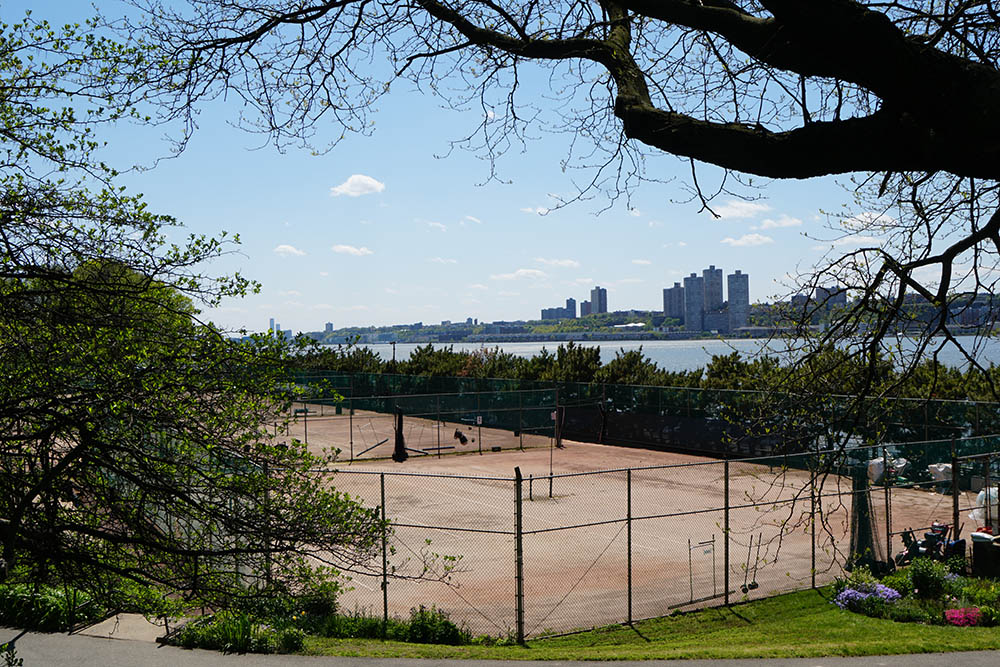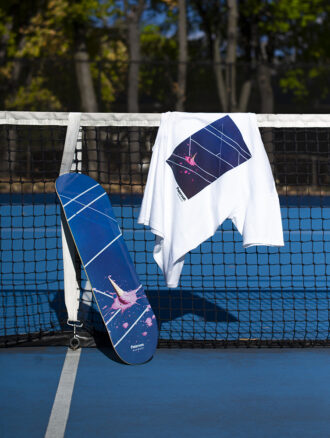By Gerald Marzorati
It finally felt like spring along the Hudson the other day, the sky blue-blue, the sun strong, jonquils and daffodils pooling yellow here and there, a sailboat gliding by. Despite the weather, the red-clay tennis courts in Riverside Park at 90th Street were empty and untended, awaiting a spring clean that should have been completed by now: a fresh layer of crushed red brick (which, in tennis, is what “clay” is), a good rolling, a brushing of the lines. If you play tennis, as I do, a glimpse of a court off season—net down, surface obscured by dead leaves—can summon a pang of bleak-mindedness. It tends to pass soon enough, like most wintry thoughts. If, however, you play tennis regularly on those red-clay Riverside courts, as I do; if you have established a web of casual acquaintances there; if you are in your late 60s and chasing down tennis balls in matches against those casual acquaintances is a significant part of how you unfold your post-career city days from April into the first weeks of October; and if you understand that those courts are likely to be closed for many weeks and possibly months: One glimpse of those courts and my pandemic-induced sunken heart sank further.
Tennis, singles anyway, is a game played at a social distance. I was ready—I was dying—to play. But who can imagine tennis courts open when playgrounds and basketball courts are padlocked? Not me. My certainty about that, though, is no solace. Like my fellow New Yorkers barred from yoga classes, or watching their beer-league softball season slip away, or, in Brooklyn or Queens or elsewhere in the city, awaiting like me the start of a tennis season that may never come, I’m dealing with some body-and-soul aspect of who I am, or sense I am, that’s feeling all seized up, stuck restlessly hibernating, despite the fine weather.
There’s a literature now devoted to how physical activity not only strengthens our muscles and organs but reshapes our minds and our moods for the better, especially as we grow old. There’s a literature, too, sociological and psychological, about how those casual acquaintances we make in our urban lives, “weak ties” as researchers refer to them, play a significant role in making us somewhat better versions of ourselves. These low-stakes relations, strangers to us except when not—bookshop owners, farmers-market-stand operators, tennis opponents—provide us a sense of belonging, bind us more strongly to place. They aren’t nearly as important as the love we share with family members or intimate partners or lifelong friends. Still, studies show, they make us happier. And research shows too that weak ties are especially important as we age. Social interactions of the kind I have with my tennis buddies—infrequent, low-intensity, limited, verbally, to the exchange of a few words before and after a match—are nevertheless preserving my cognitive function and helping to keep depression at bay.
The men I play tennis with in Riverside Park, in a men’s 60-and-over bracket—essentially a season-long round robin—are, for the most part, healthy, active representatives of what now gets called the young old. They are, most of them, between the ages of 65 and 75. They are serious recreational players. They are drawn, like me, to the clay courts, because clay is less punishing than hard courts, easier on our deteriorating hips and knees. They, like me, are white, privileged, and know it. They are retired, or, as often than not, semiretired, like the psychiatrist who sees fewer analysands. They are what gets called comfortable, not wealthy—maybe they got their co-ops at an insider price back in the 1980s, but we don’t go there. We don’t talk much about anything: Roger and Novak and Serena, our aches and pains. By Aristotle’s measure, or measures, they aren’t my friends at all: They are not useful to my position in society, they are not drinking pals, and I have no idea if I share a set of values with them. (No one brings up You-Know-Who.) So what is it I miss?

I miss the shared and intimate loneliness that is a tennis match. I miss playing, and the exhilaration that provides us—midafternoon, when the rest of the city is feverishly working, as we once did—one of the few enhanced freedoms of being 67. (The other is a 3 p.m. show at a movie theater: The coronavirus has taken that from us, too.) I miss the empathy and commiseration that accompany the adjustment of knee braces and the discussion of whether to pop Advil before or after you’re on court. I miss the sweaty hug at the net when a match is done, win or lose. We did it, one more time.
I miss, too, more selfishly, perhaps, the expanded range of emotions and states of mind summoned because a tennis buddy is willing to oppose me. This does not strike me as low-stakes. Within the confines of a tennis court, as nowhere else, I can be enkindled with envy, even hate—all it takes is a perfectly executed lob drifting over my head while I stand helplessly at net. The lower emotions pass in the time it takes to begin the next point, but I note them, recognize I’m capable of them. There are stretches in a match, rarer, measured in minutes, when I also enter, as I have never done during any other undertaking, what positive psychologists call the flow state. I am at once energized and relaxed. My focus is pure: Be. Here. Now. Everything seems slowed down and absorbable, slowed down and absorbable enough for me to reach nearly every ball and strike it cleanly. I’m fully immersed, undistracted, in the moment.
Would that I—that all of us—could find some of that un-uneasy flow just now. I can’t. I sit through hours of Zoom meetings, with fellow board members of an organization devoted to regenerative agriculture, strategizing about the worthwhile delivery of food boxes, all the while with (as my mother used to say of me) ants in my pants. I’ve always needed to move. I take long solitary walks and wonder whether my city will ever fully recover, and what my tennis pals are up to. The relationships are casual enough that I’ve got no idea how to contact them. Are they okay? Are they, like me, getting calls from their grown kids, calls in a new minor key, urging them to be very, very careful—that is, urging them to act more their age, whatever their tennis games and fitness level, because their age is not faring well against Covid-19? When I’m not taking walks or Zooming, I’m working out at home, changing things up by following fitness routines posted on Instagram by pro tennis players (Venus Williams’ is terrific). Every now and then I take a racquet out of my bag and take a few swings. No contact.
Buy Now
Patterson + Racquet Skateboard Deck
This limited-edition board from our collaboration with New Jersey’s finest skate, tennis, and athletic apparel company, Paterson League, is here just in time for your springtime needs. We’ve made only a handful of these, and all deck purchases will come with a matching tee in the size of your choosing.



